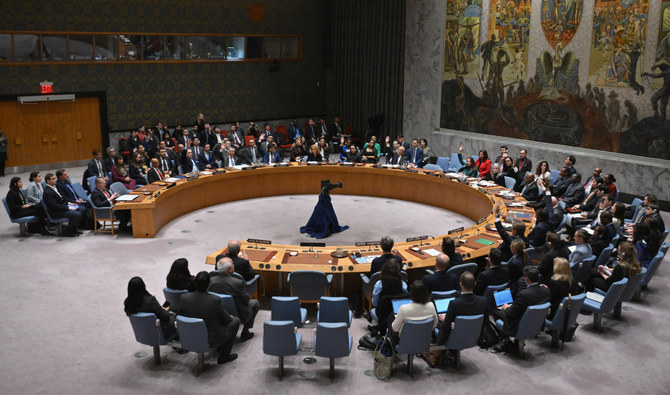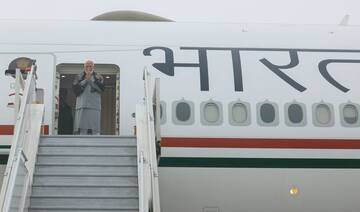NEW YORK CITY: The US on Thursday vetoed a draft resolution, drawn up by Algeria, that proposed the State of Palestine be granted full membership of the UN, thereby effectively blocking the Security Council from recognizing Palestine as a state.
Twelve members of the 15-member council voted in favor of the resolution, with the UK and Switzerland abstaining and the US voting against it. To pass, a council resolution requires at least nine votes in favor and no use of the power of veto by any of the five permanent council members: the US, the UK, France, Russia and China.
A spokesperson for the US State Department said on Thursday: “Premature actions in New York, even with the best intentions, will not achieve statehood for the Palestinian people.
“There are unresolved questions as to whether the applicant can meet the criteria to be considered as a state. We have long called on the Palestinian Authority to undertake necessary reforms to establish the attributes of readiness for statehood.
“Hamas, which is (a) terrorist organization currently exerting power and influence in Gaza, would be an integral part of the envisioned state, in this resolution. And for that reason, the United States is voting no on this proposed Security Council resolution.”
Robert Wood, the deputy representative of the US to the UN, had also reiterated that under his nation’s laws, full recognition by the UN of a Palestinian state would require that “funding would be cut off to the UN system, so we’re bound by US law.”
Prior to a previous meeting of the Security Council this month, Wood restated Washington’s long-held position that full Palestinian membership of the UN “is a decision that should be negotiated between Israel and the Palestinians … They need to work out an agreement and that’s how full membership should come about.”
Palestinian President Mahmoud Abbas submitted an application for UN membership in 2011. It was not considered by the Security Council but the following year the General Assembly granted the “State of Palestine” the more limited status of non-member observer state.
Algeria’s concise draft resolution text adhered to the typical format for Security Council resolutions suggesting a state be granted UN membership. It proposed that the Security Council, having examined the application by the State of Palestine for admission to the UN, recommend to the General Assembly that the State of Palestine be admitted as a full member.
The vote on Thursday followed a long day of high-level debate in the council chamber about the issue. UN Secretary-General Antonio Guterres opened the meeting by warning that the Middle East was “on a precipice,” and calling for “maximum restraint.”
He added that it is “high time to end the bloody cycle of retaliation. It is time to stop.”
He reiterated his condemnation of Iran’s attack on Israel this week, and of the latter’s attack on the Iranian consulate in Damascus this month.
“In Gaza, seven months of Israeli military operations have created a humanitarian hellscape,” said Guterres.
“Tens of thousands of people have been killed. Two million Palestinians have endured death, destruction and the denial of lifesaving humanitarian aid. They are now staring down starvation.
“An Israeli operation in Rafah would compound this humanitarian catastrophe,” he added, referring to threats by Israeli authorities of a ground offensive in the city in southern Gaza, which has become the last refuge for more than a million Palestinians displaced by fighting in other parts of the territory.
Ending the hostilities in Gaza would significantly help to defuse rising tensions across the region, Guterres said as he repeated his calls for an immediate humanitarian ceasefire and the release of all hostages being held in the territory.
Ziad Abu Amr, the representative of the Palestinian president, said his people long to practice their right to self-determination and to live in freedom, security and peace “in an independent state similar to other countries around the world.”
Addressing the US directly, he added: “To those who say that recognizing the Palestinian state must happen through negotiations and not through a UN resolution, we wonder once again, how was the State of Israel established? How was it recognized? Wasn’t that through a UN resolution, which is Resolution 181?
“It is high time for the Security Council to shoulder its historic responsibility and give justice to the Palestinian people by adopting a resolution to accept Palestine as a full member of the United Nations.”
Jordan’s foreign minister, Ayman Safadi, called on the Security Council to “accept the state of Palestine as a full-fledged member of the United Nations.”
He added: “Do so to uphold justice, to make peace triumphant, to reject injustice, to cry out against falsehood. Do not leave the future of the region in the hands of the most extremist elements of the Israeli government.”
Russia’s permanent representative to the UN, Vasily Nebenzia, said: “The minimum we’re compelled to do, based on all moral imperatives, is to satisfy Palestine’s aspiration for UN membership.
“We’re convinced that recognition of Palestine, on a status on a par with Israel, will help the long-term settlement of the Palestine-Israeli conflict.”
Spain’s foreign minister, Jose Manuel Albares Bueno, said his country has joined the 139 others that have already officially recognized the State of Palestine, and supports its admission to the UN.
“Spain will recognize the State of Palestine because the people of Palestine cannot be condemned to be a people of refugees,” he said. “Also because this is the way to peace in the Middle East, and because this is good for the security of Israel.
“Spain will recognize a Palestinian state because they have a right to a future with hope, just as the Israeli people have a right to a future in peace and security, and following so many decades of pain.”
Brazil’s foreign minister, Mauro Vieira, told council members that the “time has come for the international community to finally welcome the fully sovereign and independent state of Palestine as a new member of the United Nations.”
China’s ambassador to the UN, Fu Cong, called on members of the council “to take a responsible attitude in light of history and cast a favorable vote to support Palestine joining the UN family as a full member.”
Algeria’s foreign minister, Ahmad Attaf, said that full membership of the UN for Palestine is a “historical right,” and failure to grant it will guarantee the Arab-Israeli conflict is prolonged.
The UK’s representative to the UN, Barbara Woodward, said that recognition of a Palestinian state “cannot come at the start of the process but it does not have to be the very end of the process.”
She added: “Our long-standing position has been that we will recognize a Palestinian state at a time that is most conducive to the peace process. That pathway will start with fixing the immediate crisis in Gaza.”
















